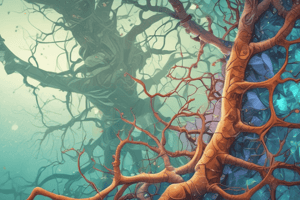Podcast
Questions and Answers
Which of the following accurately describes the relationship between biodiversity and ecological health?
Which of the following accurately describes the relationship between biodiversity and ecological health?
- Greater biodiversity generally enhances ecosystem resilience and productivity. (correct)
- Biodiversity only affects species richness, not ecosystem functionality.
- Biodiversity solely refers to the variety of species in a region.
- Higher biodiversity is always detrimental to ecosystem stability.
What is the primary purpose of the hierarchical classification system in biology?
What is the primary purpose of the hierarchical classification system in biology?
- To simplify the naming of organisms for easier communication.
- To create arbitrary groups without biological relevance.
- To classify organisms based on their physical size.
- To understand evolutionary relationships between organisms. (correct)
Which statement correctly describes the field of microbiology?
Which statement correctly describes the field of microbiology?
- Microbiology encompasses various microscopic organisms and their ecological roles. (correct)
- Microbiology only focuses on pathogenic microorganisms.
- It is exclusively concerned with fungi and their effects.
- It includes the study of unclassified and non-living entities only.
What does homeostasis primarily involve?
What does homeostasis primarily involve?
In biotechnology, which of the following applications best exemplifies genetic engineering?
In biotechnology, which of the following applications best exemplifies genetic engineering?
What is the primary difference between prokaryotic and eukaryotic cells?
What is the primary difference between prokaryotic and eukaryotic cells?
Which of the following statements regarding natural selection is correct?
Which of the following statements regarding natural selection is correct?
What aspect of genetics separates it from simply studying heredity?
What aspect of genetics separates it from simply studying heredity?
What does the cell theory emphasize?
What does the cell theory emphasize?
Which method is essential for biology to study living organisms effectively?
Which method is essential for biology to study living organisms effectively?
What is most likely to occur as a result of genetic mutations?
What is most likely to occur as a result of genetic mutations?
Which of the following represents a mechanism through which evolution occurs?
Which of the following represents a mechanism through which evolution occurs?
In the context of ecosystems, what is a key role of producers?
In the context of ecosystems, what is a key role of producers?
Flashcards
Biodiversity
Biodiversity
The variety of life at all levels, from genes to ecosystems.
Population dynamics
Population dynamics
Describes how populations change over time, including factors like growth, decline, and distribution.
Physiology
Physiology
The study of the functions of living organisms and their parts.
Taxonomic classification
Taxonomic classification
Signup and view all the flashcards
Biotechnology
Biotechnology
Signup and view all the flashcards
What is biology?
What is biology?
Signup and view all the flashcards
What are cells?
What are cells?
Signup and view all the flashcards
What is the cell theory?
What is the cell theory?
Signup and view all the flashcards
What is heredity?
What is heredity?
Signup and view all the flashcards
What is natural selection?
What is natural selection?
Signup and view all the flashcards
What is evolution?
What is evolution?
Signup and view all the flashcards
What is ecology?
What is ecology?
Signup and view all the flashcards
What is energy flow in ecosystems?
What is energy flow in ecosystems?
Signup and view all the flashcards
Study Notes
Introduction to Biology
- Biology is the natural science studying life and living organisms, including structure, function, growth, origin, evolution, and distribution.
- It encompasses many disciplines, from molecular biology to ecology.
- Key concepts include cells (fundamental units of life), evolution (natural selection), and energy flow in ecosystems.
- Biology uses scientific methods: observation, hypothesis testing, and experimentation to understand biological phenomena.
Cell Biology
- Cells are the basic structural and functional units of all living organisms.
- The cell theory states all living things are composed of cells.
- Prokaryotic cells are simpler, lacking membrane-bound organelles, while eukaryotic cells are more complex and contain various organelles.
- Key organelles: nucleus, mitochondria, endoplasmic reticulum, and Golgi apparatus.
- Cell membranes regulate substance passage, maintaining homeostasis.
- Cellular processes like respiration, photosynthesis, and protein synthesis are crucial.
Genetics
- Genetics studies genes, heredity, and variation in living organisms.
- Genes are DNA segments, holding instructions for protein building.
- DNA carries genetic information determining organism traits.
- Genes are passed to offspring via sexual reproduction.
- DNA mutations create variations and potentially new traits.
- Genetic engineering manipulates genes for various purposes, including genetically modified organisms.
Evolution
- Evolution is the change in heritable characteristics of biological populations over generations.
- Natural selection drives evolution, favoring traits improving survival and reproduction.
- Evidence for evolution includes fossil records, comparative anatomy, biogeography, and molecular biology.
- Common ancestry connects all living organisms, descending from a shared ancestor.
- Speciation is the formation of new species from existing ones.
- Adaptation is how organisms become better suited to their environments.
Ecology
- Ecology studies relationships between organisms and their environment.
- Ecosystems have biotic (living) and abiotic (non-living) components.
- Energy flows through ecosystems, usually starting with producers like plants.
- Food webs show complex feeding relationships in communities.
- Population dynamics describe population changes over time.
- Biodiversity encompasses life's variety at all levels, from genes to ecosystems.
Classification of Life
- Organisms are classified into taxonomic groups based on shared characteristics.
- The classification hierarchy includes domains (Bacteria, Archaea, Eukarya), kingdoms, phyla, classes, orders, families, genera, and species.
- This system helps scientists understand evolutionary relationships.
- Modern classification relies on evolutionary relationships (phylogeny).
Microbiology
- Microbiology studies microscopic organisms (bacteria, viruses, fungi, and protists).
- Microorganisms have crucial roles: decomposition, nutrient cycling.
- Some microorganisms are pathogenic, causing disease.
- Understanding microbial communities is essential in medicine, agriculture, and environmental science.
Physiology
- Physiology studies the functions of living organisms and their parts.
- It covers a wide range of topics, from cellular processes to organ systems.
- Specific organ systems (nervous, digestive, circulatory) are also studied.
- Homeostasis maintains a stable internal environment in an organism.
Biotechnology
- Biotechnology uses biological systems, organisms, or their derivatives for product or process development.
- It applies biological knowledge to practical applications.
- Examples include genetic engineering, pharmaceutical production, and bioremediation.
- This field has potential for solving global challenges.
Studying That Suits You
Use AI to generate personalized quizzes and flashcards to suit your learning preferences.




